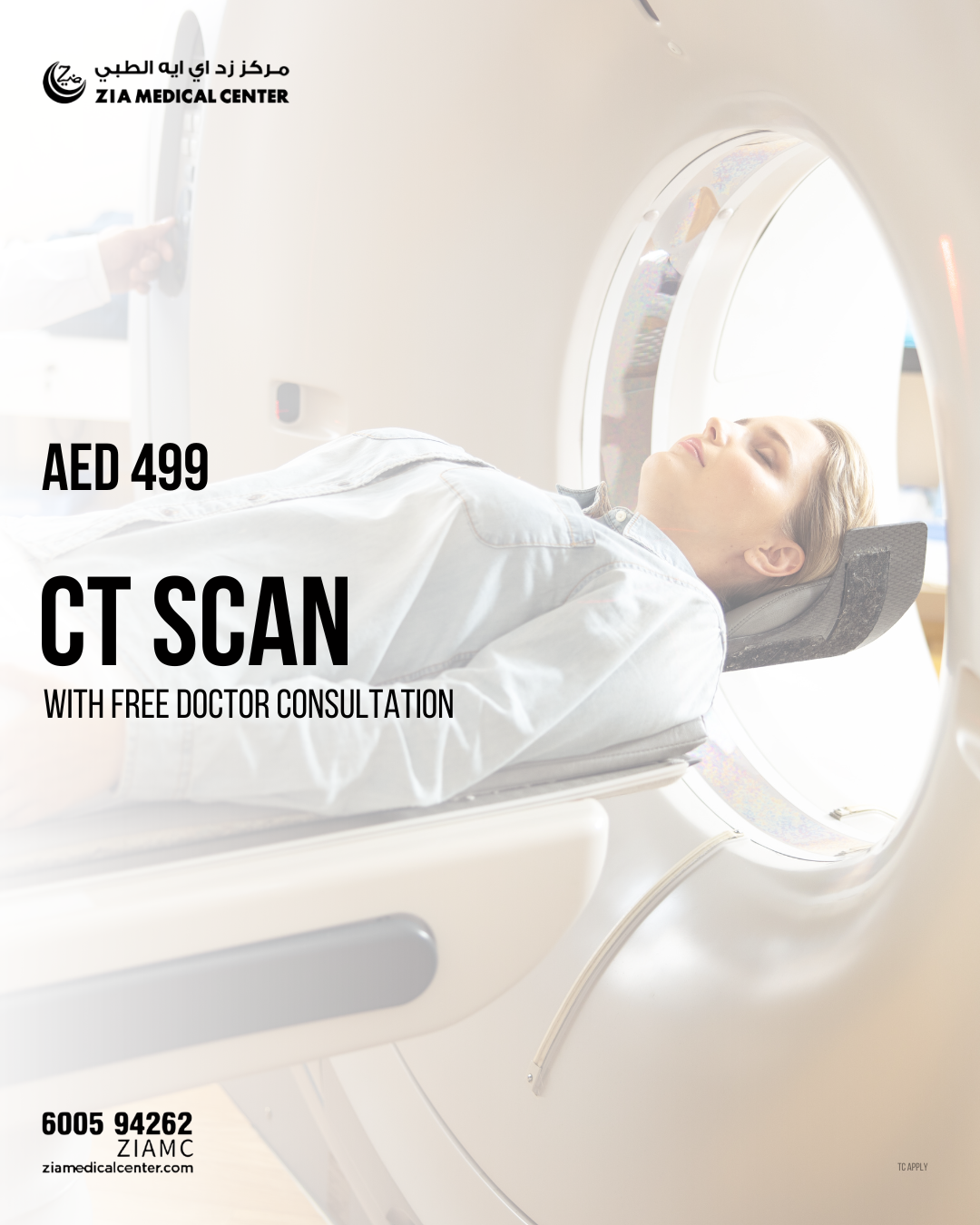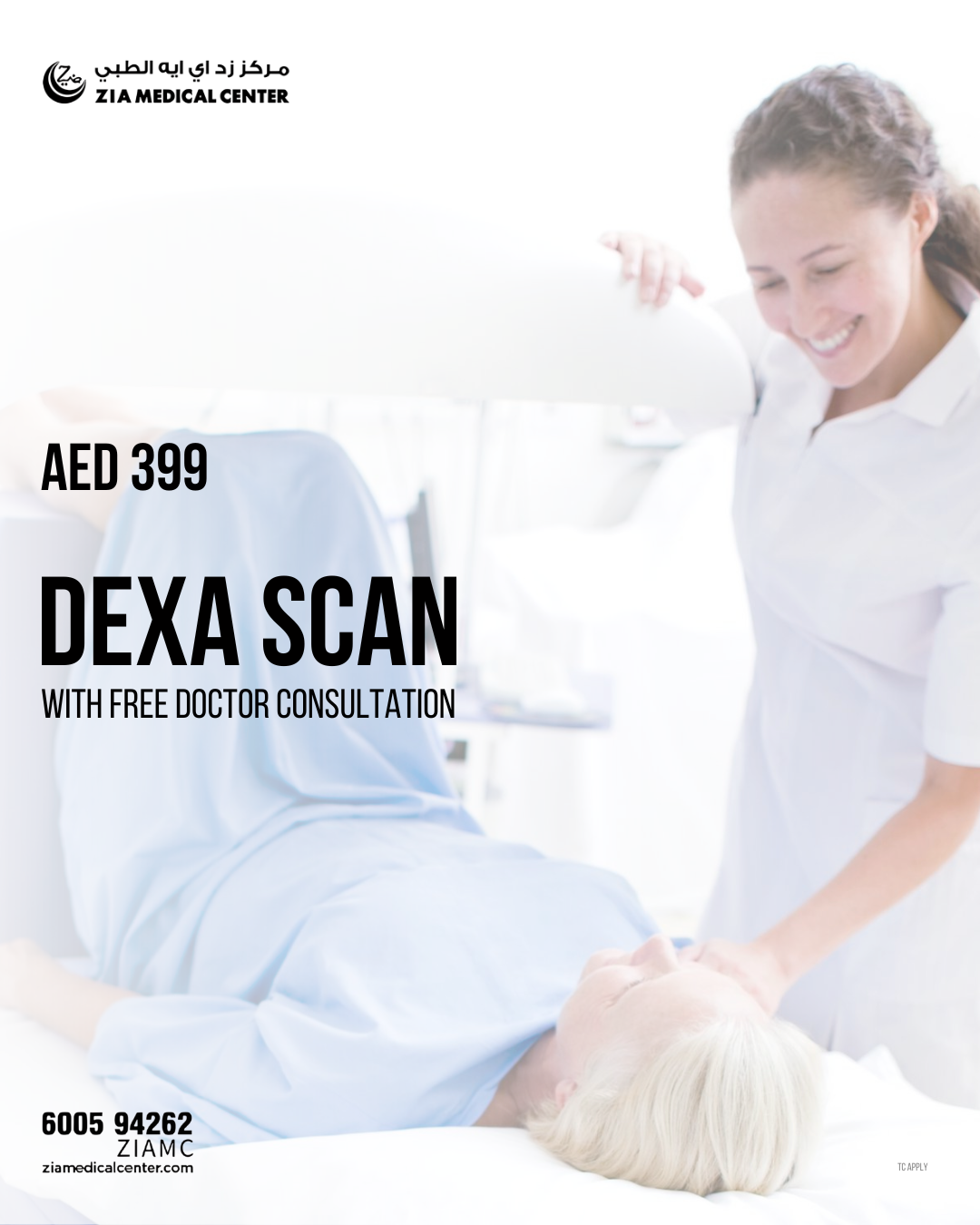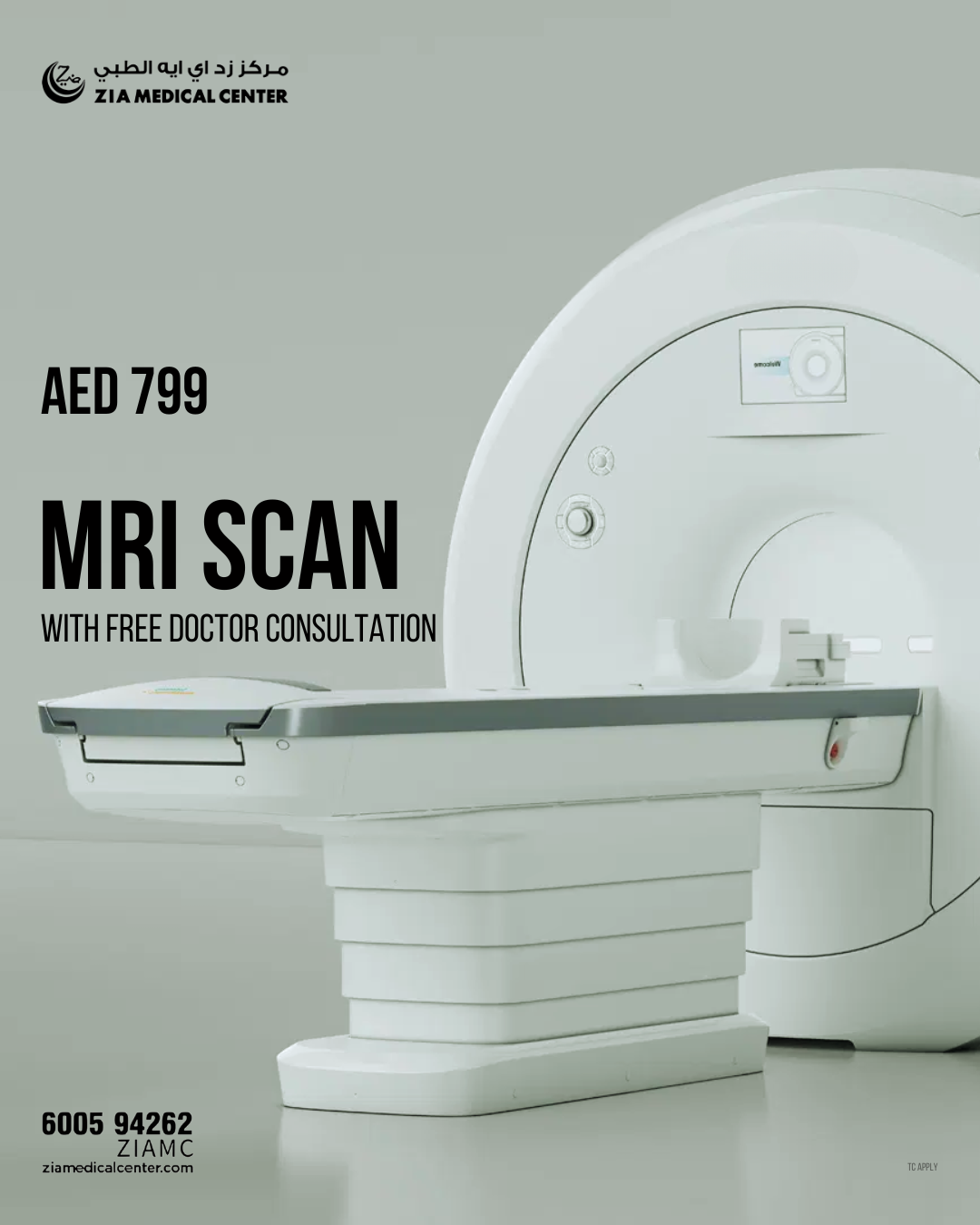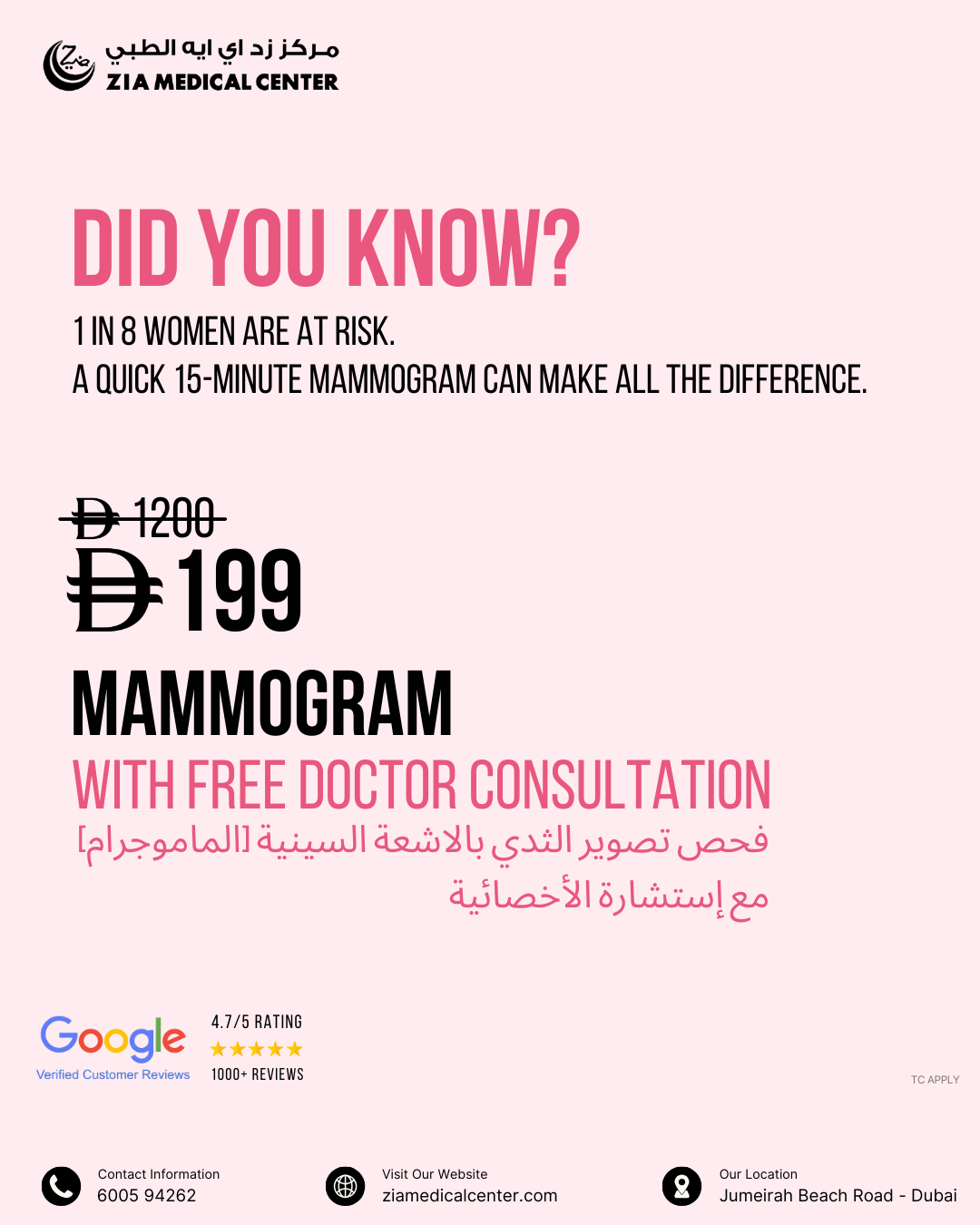Description
CT Scan in Dubai
A CT scan, also known as computed tomography, is a powerful diagnostic procedure used to identify diseases, injuries, and plan effective treatment. By utilizing X-ray images from various angles, a CT scan generates detailed cross-sectional images of your bones, blood vessels, and soft tissues. The CT scan machine consists of a circular tube that rotates around you, capturing a comprehensive 360-degree view of your body’s interior. This advanced imaging technique provides a thorough 3D perspective, enabling our specialist to make accurate diagnoses and develop targeted treatment plans.
Why are CT scans done?
CT scans are performed for various reasons, including:
Identify internal bleeding and injuries: CT scans in Dubai can help detect internal bleeding and injuries caused by trauma or accidents, allowing our doctors to provide immediate medical intervention.
Locate tumors, infections, and blood clots: CT scans in Dubai provide detailed images that help our doctors locate tumors, infections, and blood clots in different parts of the body, enabling accurate diagnosis and appropriate treatment.
Detecting bone injuries and fractures: CT scans in Dubai are effective in identifying bone injuries and fractures, providing detailed images that assist in determining the extent of the damage and guiding treatment options.
Direct treatment plans: CT scans in Dubai are commonly used to guide treatment plans, such as surgical procedures and biopsies. The precise imaging provided by CT scans helps our doctors accurately target affected areas and plan the most effective course of action.
Monitor diseases: CT scans in Dubai are valuable in monitoring the progression of various diseases, including cancer, heart disease, and liver masses. Regular CT scans can provide crucial information about the size, location, and response to treatment of these conditions.
Track treatment outcomes: CT scans in Dubai are used to assess the effectiveness of specific treatments, such as cancer treatment. By comparing CT scan images taken before and after treatment, our doctors can evaluate the success of the treatment and make any necessary adjustments.
CT scans in Dubai are a versatile diagnostic tool that plays a vital role in diagnosing and managing a wide range of medical conditions. The detailed images obtained from CT scans provide valuable information for accurate diagnosis, treatment planning, and monitoring of various diseases and injuries.
How to prepare for CT Scan in Dubai
To prepare for a CT scan in Dubai, follow these steps:
Clothing and metallic items: Our technologist will ask you to remove any clothing that might interfere with the scan, including jewellery, eyeglasses, or hairpins. A hospital gown will be given to you to wear throughout the process.
Fasting: Depending on the type of CT scan in Dubai, you may be required to fast for a few hours before the procedure. This is typically necessary when contrast material is used. Follow the specific instructions provided by our technologist regarding fasting.
Contrast material: In some cases, a contrast material may be used to enhance the visibility of certain structures in the body. This material can be administered orally, through injection depending on the area being examined. Our technologist will inform you if contrast material is necessary for your CT scan in Dubai.
Oral contrast: You may be asked to drink a liquid containing contrast material before the scan. It is important to follow the instructions on when and how much to consume.
Injection contrast: If an injection is required, a contrast material will be injected into your vein. It is common to feel a warm sensation or metallic taste after the injection.
Inform our technologist: It is important to inform our technologist about any existing medical conditions, allergies, or previous adverse reactions to contrast material. This will help ensure your safety during the procedure.
By following these preparation guidelines, you can ensure a smooth and successful CT scan in Dubai. It is essential to communicate openly with our technologist/doctor and ask any questions you may have before the procedure.
What Happens during a CT Scan in Dubai?
During a CT scan in Dubai, the following steps typically occur:
Positioning: You will be positioned on a table that slides into the doughnut-shaped CT scanner. Our radiology technologist will ensure that you are comfortably positioned for the scan.
Table movement: The table will slowly move into the scanner as the detectors and X-ray tube rotate around you. This allows for the collection of multiple images or slices of your body.
Image acquisition: The CT scanner will emit X-ray beams as it rotates, capturing images of the targeted area. These images are obtained from different angles and are processed by a computer to create detailed cross-sectional images.
Stillness and breath-holding: It is important to remain still during the scan to avoid blurring the images. Our technologist may instruct you to hold your breath briefly during certain scans to minimize motion artifacts.
Scanner noises: You may hear whirring or buzzing sounds during the scanning process. These noises are normal and indicate that the equipment is functioning properly.
Table movement and completion: After the necessary images are acquired, the table will move back out of the scanner. The scan is then complete, and you will be able to leave the examination room.
Throughout the procedure, our radiology technologist will be present in a separate control room, monitoring the scan and communicating with you via an intercom. If you have any concerns or discomfort during the scan, you can communicate with our technologist who will assist you.
What happens after a CT Scan in Dubai?
After a CT scan in Dubai, the following steps typically occur:
Completion of the scan: Once the CT scan is finished and clear images have been obtained, you will be able to leave the imaging facility and resume your regular activities.
Post-scan instructions: If you were administered a contrast material during the scan, our doctor may provide specific instructions. These instructions may include drinking plenty of water to help your kidneys flush out the contrast material from your system. It is important to follow any post-scan instructions provided by our doctor.
Image interpretation: The CT scan images will be reviewed and interpreted by our radiologist, who specializes in medical imaging. Our radiologist will analyze the images and prepare a report detailing the findings.
Report delivery: The radiology report will be sent to our doctor, who requested the CT scan. The report provides an explanation of the results and may include any identified abnormalities or relevant findings. The timeframe for receiving the report may vary, but it is typically available within a few hours to 24 hours after the scan.
Follow-up consultation: Our doctor will review the radiology report and discuss the results with you during a follow-up appointment. They will explain the implications of the findings and determine the appropriate next steps in your healthcare management.
It is important to follow up with our doctor to discuss the results and any recommended further testing or treatment based on the CT scan findings. They will be able to provide you with a comprehensive understanding of your health status and guide you in making informed decisions regarding your care.
What is a CT Scan with Contrast?
During a CT scan in Dubai with contrast, certain preparations and precautions are necessary:
Fasting: The patient will be instructed to fast before the procedure. This means avoiding food and drink for a specific period of time before the scan.
Medical history disclosure: It is important for the patient to inform our radiographer about any significant health conditions or recent surgeries. Certain conditions, such as severe kidney disease or a liver transplant, may affect the use of iodinated contrast material.
Kidney function evaluation: A blood test, usually measuring creatinine levels, may be performed to assess the patient’s kidney function. This helps determine if the kidneys are functioning adequately to process and eliminate the contrast material.
Allergy assessment: Our radiographer or a nurse will inquire about any allergies the patient may have, such as drug allergies, food allergies, or environmental allergies. It is especially important to mention if the patient has asthma or diabetes. This information helps determine if any precautions or pre-medication are necessary.
Contrast material and allergies: The contrast material used in CT scans contains iodine. Although advancements have been made to reduce allergic reactions, if the patient has known allergies, appropriate assessment or pre-medication may be considered before administering the contrast material.
Hydration after the procedure: After receiving the contrast material, the patient will be advised to drink plenty of water for the next 24 hours. This helps flush out the contrast material from the system.
Breastfeeding considerations: For breastfeeding patients, our doctor will assess when it is safe to continue breastfeeding their infants after the CT scan. This evaluation ensures the well-being of both the patient and the infant.
It is important to follow these instructions and communicate any concerns or medical conditions to ensure a safe and effective CT scan in Dubai procedure with contrast.
CT Scan Services at Zia Medical Center in Dubai
CT abdomen scan: During an abdominal CT scan, a technologist will capture images of the organs of the digestive tract, such as the intestines, colon, liver, spleen and appendix. A doctor might order an abdomen scan to detect abscesses in the area, to discover internal bleeding or to identify and diagnose tumors, such as those in the colon.
Head or Brain CT: A doctor might order a head or Brain CT for a patient who is experiencing unexplained headaches or dizziness. The procedure can also help diagnose brain tumors or strokes. A head or Brain CT captures images of the brain and other areas of the head, such as the sinuses. Patients with ongoing sinus issues might benefit from a head CT to determine if there is ongoing inflammation in the area.
CT scan chest/lungs: A CT scan of the chest can provide a doctor with detailed images of a person’s lungs. Doctors might order the scan if a patient complains of having trouble breathing or of having chest pain. The images can help doctors diagnose conditions such as lung cancer, pneumonia, tuberculosis or excess fluid in the lungs.
CT neck: A CT scan of the neck typically captures images of the area from the base of the skull to the top of the lungs. The scan can detect and diagnose tumors or masses in the neck, on the tongue, on the vocal cords or in the upper airway. A doctor can also detect growths or abnormalities on the thyroid gland or issues with the carotid artery using a neck CT scan.
Pelvic CT scan: A pelvic CT will take pictures of the area inside the body between the hipbones. It can help diagnose issues with the male or female reproductive systems or to identify bladder problems, such as bladder stones or tumors.
CT scan kidneys: A common reason for a CT scan of the kidneys is to detect and confirm the presence of kidney stones. The scan can also help identify tumors, abscesses and signs of kidney disease.
CT scan of the spine: Spinal CT scans capture images of the bony spinal structure, the discs between the bones and the soft tissue of the spinal column. A CT scan of the spine can help a doctor assess injury to the area, diagnose herniated discs and evaluate the area before surgery. In some cases, a doctor might use a spinal CT to gauge bone loss in the area as a result of osteoporosis. A CT scan of the spine can also be an aid during a biopsy or other procedure.




